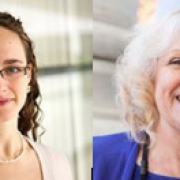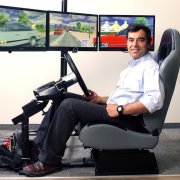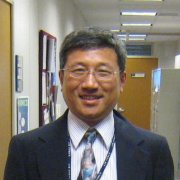May 5, 2017 - 4:00 pm
Erik Brynjolfsson (MIT)
Title: What Can Machines Learn, and What Does It Mean for Occupations and Industries?
Abstract: This talk will present a preliminary framework and approach for understanding the potential effects of machine learning (ML) on tasks, occupations and industries. Digital technologies have already had a...
Abstract: This talk will present a preliminary framework and approach for understanding the potential effects of machine learning (ML) on tasks, occupations and industries. Digital technologies have already had a...
April 21, 2017 - 4:00 pm
Jacob Feldman (Rutgers)
Title: Perceptual Organization From a Bayesian Point of View
Abstract: Perceptual organization is the process by which the visual system groups the visual image into distinct clusters or units. In this talk I'll sketch a Bayesian approach to grouping, formulating it as an inverse inference problem...
Abstract: Perceptual organization is the process by which the visual system groups the visual image into distinct clusters or units. In this talk I'll sketch a Bayesian approach to grouping, formulating it as an inverse inference problem...
April 12, 2017 - 2:00 pm
David Vogel, Trustee (Voloridge Investment Management, LLC)
Abstract: The introductory portion of this talk will review some state-of-the-art machine learning techniques. We will discuss concepts of ensembles and popular methodologies within this category. We’ll touch upon collaborative filtering techniques used for recommendation systems, and we’ll present...
March 24, 2017 - 4:30 pm
Amnon Shashua - Hebrew University, Co-founder, CTO and Chairman of Mobileye
Abstract: The field of transportation is undergoing a seismic change with the coming introduction of autonomous driving. The technologies required to enable computer driven cars involves the latest cutting edge artificial intelligence algorithms along three major thrusts: Sensing, Planning and...
February 21, 2017 - 4:00 pm
Ilya Nemenman (Emory College)
Abstract: Last two-three decades have convinced the computational neuroscience community that sensory neurons encode information about the world not just in their firing rate, but also in the precise timing of their action potentials. However, whether this information is used by animals to actually...
February 10, 2017 - 4:00 pm
Dr. Brian Subirana
, Dr. Bror Saxberg
In this talk, Brian Subirana will first review research conducted over the last 120 years since Ebbinghaus's seminal work in 1885 on the forgetting curve. This review (joint work in progress with Aikaterini Bagiati and Sanjay Sarma) aims to understand whether, and to what extent, what is learned in...
December 2, 2016 - 4:00 pm
Margaret Livingstone and Michael Arcaro (Harvard Medical School)
, Rebecca Saxe (MIT BCS)
CBMM Special Seminar: Topological Treatment of Neural Activity and the Quantum Question Order Effect
April 26, 2016 - 4:00 pm
Seth Lloyd, MIT Department of Mechanical Engineering
Abstract: The order in which one asks people questions affects the probability of their answers. Similarly, in quantum mechanics, the order in which measurements are performed affects the probability of their outcomes. The quantum order effect has a specific mathematical pattern, which --...
April 20, 2016 - 5:00 pm
Demis Hassabis, Google DeepMind
Abstract: Dr. Demis Hassabis is the Co-Founder and CEO of DeepMind, the world’s leading General Artificial Intelligence (AI) company, which was acquired by Google in 2014 in their largest ever European acquisition. Demis will draw on his eclectic experiences as an AI researcher, neuroscientist and...
November 13, 2015 - 4:00 pm
Mark J. Schnitzer
Prof. Mark J. Schnitzer, Departments of Biology and Applied Physics, Howard Hughes Medical Institute, Stanford University
Abstract: A longstanding challenge in neuroscience is to understand how the dynamics of large populations of individual neurons contribute to animal behavior and brain disease....
Abstract: A longstanding challenge in neuroscience is to understand how the dynamics of large populations of individual neurons contribute to animal behavior and brain disease....
September 9, 2015 - 4:00 pm
Jaan Tallinn
CBMM will host a brief talk by Jann Tallinn (followed by extensive QAs): Solving Global Coordination
Jaan Tallinn is an Estonian computer scientist who participated in the development of Skype in 2002 and FastTrack/Kazaa, a file-sharing application, in 2000.
He graduated from the University of...
Jaan Tallinn is an Estonian computer scientist who participated in the development of Skype in 2002 and FastTrack/Kazaa, a file-sharing application, in 2000.
He graduated from the University of...
April 28, 2015 - 4:00 pm
Prof. Justin Wood, USC
Abstract: What are the origins of high-level vision: Is this ability hardwired by genes or learned during development? Although researchers have been wrestling with this question for over a century, progress has been hampered by two major limitations: (1) most newborn animals cannot be raised in...
April 14, 2015 - 4:00 pm
Prof. Thomas Serre, Brown University
Abstract: Perception involves a complex interaction between feedforward (bottom-up) sensory-driven inputs and feedback (top-down) attention and memory-driven processes. A mechanistic understanding of feedforward processing, and its limitations, is a necessary first step towards elucidating key...
March 23, 2015 - 4:00 pm
MIT: McGovern Institute Singleton Auditorium, 46-3002
Prof. Amnon Shashua, Hebrew University, Co-founder, Chairman & CTO, Mobileye (NYSE:MBLY), OrCam.
Brief Biography:
Amnon Shashua holds the Sachs chair in computer science at the Hebrew University. He received his Ph.D. degree in 1993 from the AI lab at MIT working on computational vision where he pioneered work on multiple view geometry and the recognition of objects under variable lighting....
Amnon Shashua holds the Sachs chair in computer science at the Hebrew University. He received his Ph.D. degree in 1993 from the AI lab at MIT working on computational vision where he pioneered work on multiple view geometry and the recognition of objects under variable lighting....
December 2, 2014 - 9:00 pm
Prof. Jun Zhang, Department of Psychology and Department of Mathematics University of Michigan, Ann Arbor
Theory-of-mind (ToM) is the modeling of mental states (such as belief, desire, knowledge, perception) through recursive (“I think you think I think …”) type reasoning in order to plan one’s action or anticipate others’ action. Such reasoning forms the core of strategic analysis in the game-...















